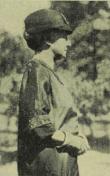Coungeau was born Emily Howard, the youngest of twelve children. She was educated at an English village school before securing employment as a lady's companion to the Princess of Lusignan while still in her early teens. This position allowed her to travel extensively and become proficient in five languages. Coungeau migrated to Australia in 1887 to join three of her brothers, all of whom were to achieve public recognition in South Australia. In 1889 she married Naoum Kongos (later to be known as Norm Coungeau), an Albanian she had met in Greece. They moved to Brisbane where they established a wine salon. The business prospered and they went on to establish a restaurant and invest extensively in city property.
Although she did not begin to publish her work until she was past fifty, Coungeau was a prolific poet. Her writings were published in the Brisbane Courier, the Australian Woman's Mirror and the Bulletin. She produced four volumes of verse as well as a 'romantic poetical drama', Princess Mona (1917), which became the libretto for the opera Auster, staged in Sydney in 1922 and Melbourne in 1935.
Coungeau won the 1924 Centenary Prize for her poem 'Commemoration'. In 1935 she was awarded a Silver Jubilee Medal by King George V. She was granted life membership of the Society of British Authors, Composers and Arrangers in the same year. Coungeau is seen as the first of the cosmopolitan, urban women writers. The Coungeaus were also well-known philanthropists who supported many public causes, including women artists and women's groups. They also donated an aeroplane to the Courier-Mail, thus allowing the paper to be the first Australian daily newspaper to establish an air delivery service.
Coungeau died in July 1936. Naoum Coungeau died five weeks later.
The Coungeau papers are held in the University of Queensland Library and the Queensland State Library.
Major source: Australian Dictionary of Biography Online Edition, http://www.adb.online.anu.edu.au/biogs/AS10104b.htm
Sighted: 14/10/2010
 8858392732660947893.jpg
8858392732660947893.jpg